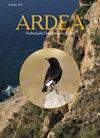Seed Dispersal by an Invasive Exotic Bird in Europe
IF 1.3
4区 生物学
Q3 ORNITHOLOGY
引用次数: 1
Abstract
Native birds play a critical role in seed dispersal. The introduction of a new species may result in unpredictable effects on an ecosystem, namely in terms of seed dispersal. The Red-billed Leiothrix Leiothrix lutea is a frugivorous species native to Asia, whose potential role as seed disperser has not yet been analysed in its introduced range in Europe. We compared the role of Leiothrix with that of Eurasian Blackcap Sylvia atricapilla and European Robin Erithacus rubecula, which are among the native species with seed dispersal roles in Europe. We compared seed expelling behaviour among species (defecation or regurgitation of seeds), which can potentially shape seed dispersal, depending on whether the seeds germinate following expulsion. Field work was conducted in Central Portugal between November 2014 and January 2015 and included bird captures to collect faecal samples, followed by faecal analysis to check for the presence of seeds. We also surveyed plant species abundance and fruit availability in the study site. The feeding and seed defecation behaviour of Leiothrix closely matched that of Robins, as most individuals of both species consumed fruits without ingesting seeds and their faeces mainly contained plant material and few seeds. On the contrary, more than half of Blackcap faeces contained seeds. All three species ate similar plant species. Although Leiothrix faeces indicate that this species primarily eats fruits without ingesting seeds; a small fraction of faeces samples (c. 13%) contained seeds. Our results suggest that Leiothrix has low potential to be a seed disperser in Central Portugal and probably elsewhere.一种外来入侵鸟类在欧洲的种子传播
本地鸟类在种子传播中起着至关重要的作用。引入一个新物种可能会对生态系统产生不可预测的影响,即种子传播。红嘴黄颡鱼是一种原产于亚洲的食草物种,其作为种子传播者的潜在作用尚未在欧洲的引种范围内进行分析。我们将Leiothrix的作用与欧亚黑冠Sylvia atricapilla和欧洲Robin Erithacus rubecula的作用进行了比较,它们是欧洲具有种子传播作用的本土物种之一。我们比较了不同物种的种子排出行为(排便或种子反流),这可能会影响种子的传播,这取决于种子排出后是否发芽。2014年11月至2015年1月,在葡萄牙中部进行了实地工作,包括捕获鸟类以收集粪便样本,然后进行粪便分析以检查是否存在种子。我们还调查了研究地点的植物物种丰度和果实可用性。Leiothrix的进食和种子排便行为与Robins的非常相似,因为这两个物种的大多数个体在食用水果时都没有摄入种子,而且它们的粪便主要含有植物材料和少量种子。相反,超过一半的黑帽粪便中含有种子。这三个物种都吃相似的植物。尽管Leiothrix的粪便表明该物种主要吃水果而不摄入种子;一小部分粪便样本(c.13%)含有种子。我们的研究结果表明,Leiothrix在葡萄牙中部和其他地方成为种子传播者的潜力很低。
本文章由计算机程序翻译,如有差异,请以英文原文为准。
求助全文
约1分钟内获得全文
求助全文
来源期刊

Ardea
生物-鸟类学
CiteScore
2.10
自引率
0.00%
发文量
49
审稿时长
>12 weeks
期刊介绍:
Ardea is the scientific journal of the Netherlands Ornithologists'' Union, and is published since 1912. The journal welcomes manuscripts reporting significant new findings in ornithology, in particular those covering the ecology, life history, and evolution of birds, and including sound descriptive work. Ardea publishes Original research papers, Short notes and Book reviews. In addition to the regular three issues per year, Ardea publishes specials that contain conference or workshop proceedings (produced on request).
 求助内容:
求助内容: 应助结果提醒方式:
应助结果提醒方式:


